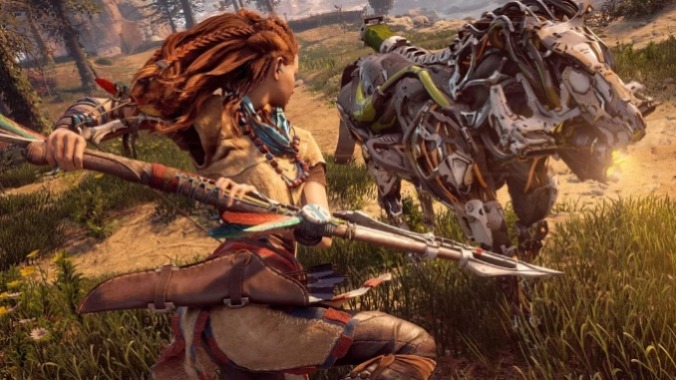
At the restaurant where I worked every summer for five years, everyone who wasn’t management hated pay day. There was no joy in ripping open an intricately sealed check only to discover that, after taxes, your labor was worth zero dollars and zero cents. We made our money through tips, meaning everyone jostled for more tables and larger parties than they could handle in an effort to at least reach minimum wage. Sometimes we walked out with stacks of cash; most times we barely broke even. Hospitality is a broken industry that chronically underpays and overworks staff while placing the burden of compensation almost entirely on the customer—which is why it’s perfect that former Blizzard CEO Mike Ybarra went viral recently for suggesting that gamers, a famously charitable and mentally sound bunch, should be able to tip developers.
As a thought experiment, let’s wipe away everything we know about Ybarra. Let’s forget about the drastic pay gap between him and his former Blizzard co-president Jen Oneal, his ultimatum that forced employees to return to the office or lose their jobs, and the golden parachute cushioning his departure after the Microsoft—Activision-Blizzard merger. In this experiment Mike Ybarra isn’t an out of touch executive who helped implement the controversial stack ranking system, which forced managers to deem 5% of their worst employees “developing,” ruining their chance at future promotions and bonuses: he’s Mike Ybarra, chill gamer guy. And this chill gamer guy has spent a lot of time playing single player games lately and thinks we should be able to kick another $10 or $20 over to developers for doing a superduper job.
Ybarra claims he isn’t stupid: he “knows most will dislike this idea” because “we are tired of ‘tipping’ in everything else.” But some games—specifically Horizon Zero Dawn, God of War (year unspecified), Red Dead Redemption 2, Baldur’s Gate 3, Elden Ring, and etc.—deserve a little treat. Nevermind that these are some of the most well regarded and highest grossing games of the last decade: they’re special and worth far more than $60 or $70.
How do you decide what deserves a tip and what doesn’t? Does Aloy pull out an iPad and ask you to choose between 15%, 20%, and 25%? Does Malenia pause before the final strike to ask if you’d like to donate $5 toward Shadow of the Erdtree’s development? I can imagine the practice spreading through the industry like wildfire, an icon of a cartoon burlap sack ripe with coins stamped onto every console menu and digital shop (except for Steam, where it would be replaced with Gabe Newell’s grinning face). If I do decide to tip, can I choose where the money goes directly, and will the storefront and publisher and executive suite all take cuts until a few dollars trickle down to the development team? What about independently developed games, which conspicuously aren’t on Ybarra’s list nor mind, whose shorter lengths often lead to inane arguments that they should cost less: should they sell for cheaper and rely on tips to make up the rest?
Ybarra isn’t interested in posing these questions let alone answering them. That wouldn’t be cool gamer guy of him. He’s just pointing out that, maybe, tipping developers could be neat, but he doesn’t understand why the practice exists in the first place. Tipping is duct tape holding together an incredibly broken system, one where service workers sink or swim based on the kindness of customers while owners gouge prices into the realm of luxury. I am under no illusions that, for many restauranteurs, the service industry is an unforgiving slog with thin profit margins that offer little reward. Most restaurants would crumble if they were forced to pay minimum wage, so rather than fix anything they beg for a legal exemption that pits waitstaff against one another to push food, desserts, and high priced drinks with a smile all in an effort to become the best little capitalist. It’s the premiere American meritocracy: if you want to survive then work your ass off and earn that wage, otherwise you’re just lazy.
The games industry is in shambles—layoffs are endemic, studios that haven’t even released their first game are being shuttered without warning, and game budgets are inflating past $200 million, which scares investors from taking chances on new ideas—and without continued unionization and corporate accountability, it’s only going to crumble more. But tipping isn’t the way to solve anything because, believe it or not, it already exists, in the form of loot boxes, microtransactions, character skins, dance moves, battle passes, and so on. What else can you call money spent on a game you alread bought besides a tip? They’re called “live service” games for a reason. Dripfeeding content and locking things behind paywalls are the only ways corporate vultures feel they can justify the increasingly costly endeavor that is game development. We’ve reached the point where developers, much like waitstaff, will lose their jobs if players don’t tip. It doesn’t help that some customers, bastions of charity and monetary donation, can really suck and often harass developers for any number of reasons, often centered around “wokeness.”
The most deliciously ironic aspect of this entire discourse isn’t that Ybarra is just some rich, out-of-touch dude who suggested the implementation of a toxic system. It’s that he helped pioneer an identical toxic system known as “live service” while minimizing developer pay during his time at Activision-Blizzard. Games is already a service industry: precarious, dysfunctional, and serving customers who have little understanding of how the product is actually made.
Mik Deitz is a freelance writer and former Paste intern. They inhale stories in videogames, films, TV and books, and have never finished God of War (2018). Yell at or compliment them on Twitter @dietdeitz.